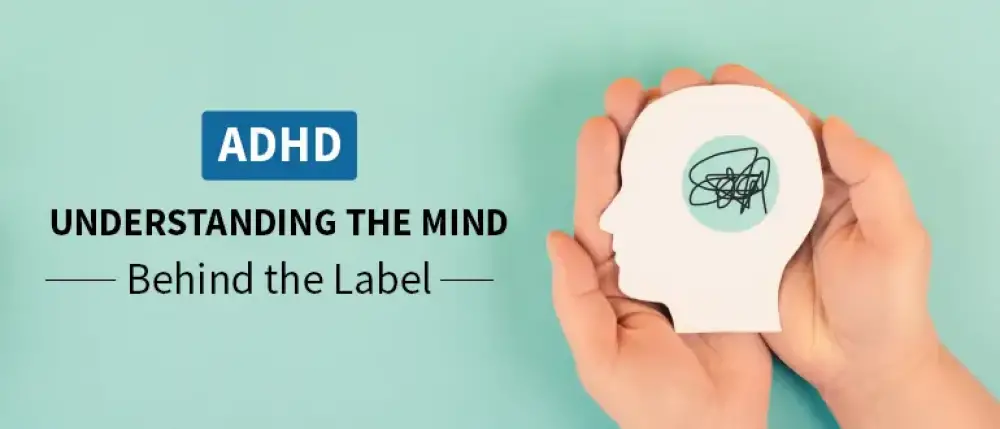Subscribe to get weekly insights
Always stay up to date with our newest articles sent direct to your inbox
Published on 26 May, 2023
Updated on 25 Nov, 2023
1054 Views
3 min Read

Written by Care Health Insurance
favorite0Like
favoriteBe the First to Like
In today's fast-paced world, where distractions abound and attention spans are constantly tested, it is vital to recognise and understand the challenges faced by individuals with Attention-Deficit/Hyperactivity Disorder (ADHD). ADHD is a neurodevelopmental condition that affects people of all ages, causing difficulties in regulating attention, impulsivity, and hyperactivity. While "ADHD" is frequently heard and discussed, it is crucial to delve beyond the surface and gain a deeper understanding of this complex condition.
Attention Deficit Hyperactivity Disorder (ADHD), also known as Attention Deficit Disorder (ADD), is a neurodevelopmental disorder affecting children and adults. It is characterised by persistent hyperactivity, impulsivity, and inattention, which can significantly impact daily functioning and quality of life. This blog will explore ADHD symptoms and treatment, its definition, and its diagnosis.
ADHD is a condition that affects the brain's executive functions, such as attention, impulse control, and self-regulation. It is typically diagnosed in childhood, but symptoms can persist into adolescence and adulthood. According to the International Classification of Diseases, 10th edition (ICD-10), ADHD is classified into three subtypes:
Hyperactive-Impulsive Type: Individuals exhibit excessive physical activity, restlessness, impulsive behaviour, and difficulty maintaining attention.
Inattentive Type: Individuals have difficulty sustaining attention, organising tasks, and following instructions, but without hyperactivity or impulsivity.
Combined Type: This is the most common subtype, where individuals exhibit inattentive and hyperactive-impulsive symptoms.
To know about ADHD fully, exploring the underlying neurobiological mechanisms at play is essential. We will delve into the specific brain regions implicated in ADHD, such as the prefrontal cortex and the dopamine pathways, and how their dysregulation contributes to the disorder's core symptoms. By understanding neurobiology, we can understand why individuals with ADHD experience attention-related challenges, impulsivity, and hyperactivity.
The Hyperactivity symptoms can vary in severity and presentation but commonly include the following:
Hyperactivity: Restlessness, constant movement, excessive talking, fidgeting, and difficulty engaging in quiet activities.
Impulsivity: Acting without thinking, interrupting others, difficulty waiting for turns, and making hasty decisions.
Inattention: Difficulty sustaining attention, being easily distracted, forgetfulness, disorganisation, and difficulty following instructions or completing tasks.
It is important to note that not all individuals with ADHD exhibit hyperactivity. In some cases, individuals may primarily display symptoms of inattention, which often go unnoticed or are mistaken for laziness or lack of motivation.
Children with ADHD may experience academic difficulties, impaired social interactions, and behavioural challenges. They may struggle with completing homework, following instructions, and maintaining focus in school. Additionally, impulsivity and hyperactivity can make it challenging for children to sit still or engage in age-appropriate activities. Early identification and intervention are crucial for managing symptoms and supporting academic and social development.
While ADHD is often associated with childhood, it is increasingly recognised that it can persist into adulthood. Adult attention deficit disorder may manifest differently, with symptoms often characterised by difficulties with time management, organisation, and maintaining relationships. Adults with ADHD may experience chronic disorganisation, forgetfulness, impulsive decision-making, restlessness, and difficulty concentrating. Identifying and addressing attention deficit disorder in adults can significantly improve personal and professional lives.
Diagnosing ADHD involves a comprehensive evaluation considering multiple factors, such as observed behaviours, medical history, and psychometric tests. The diagnosis typically includes:
It is essential to rule out other possible causes of the symptoms, such as medical conditions or mental health disorders, before confirming an ADHD diagnosis.
ADHD treatment typically involves a multimodal approach that combines various strategies tailored to individual needs. Once diagnosed, different treatment options are available to manage symptoms and improve overall functioning. These include:
Medication: Stimulant medications, such as methylphenidate or amphetamines, are often prescribed to manage symptoms of ADHD. These medications can help improve attention, reduce impulsivity, and control hyperactivity.
Behavioural Therapies: Psychoeducation and behavioural therapies, such as cognitive-behavioural therapy (CBT), can benefit individuals with ADHD. These therapies provide strategies to manage symptoms, improve organisational skills, and develop coping mechanisms.
Supportive Interventions: Providing a supportive environment and implementing accommodations can significantly aid individuals with ADHD. This may include structuring tasks, breaking them into smaller, manageable steps, and providing visual cues or reminders.
Lifestyle Modifications: Adopting a healthy lifestyle can also positively impact managing ADHD symptoms. Regular exercise, sufficient sleep, a balanced diet, and stress management techniques can help improve overall well-being.
Attention Deficit Hyperactivity Disorder (ADHD) is a neurodevelopmental disorder characterised by hyperactivity, impulsivity, and inattention. While it is commonly associated with childhood, ADHD can persist into adulthood and pose unique challenges. Seeking a professional evaluation is crucial for accurate diagnosis and tailored treatment. With medication, behavioural therapies, supportive interventions, and lifestyle modifications, individuals with ADHD can effectively manage their symptoms and improve their overall quality of life. A medical insurance policy can help you deal with the financial stress of all your health concerns.
>> Also Read: What are the 4 Stages of HIV Infection?
Disclaimer - The above information is for reference purposes only: Policy Assurance and Claims at the underwriter's discretion.
favoriteBe the First to Like
Thyroid : मामूली नहीं हैं महिलाओं में थायराइड होना, जानें इसके लक्षण और घरेलू उपचार Vipul Tiwary in Diseases
शुगर कंट्रोल कैसे करे? जानें, डायबिटीज में क्या खाना चाहिए Vipul Tiwary in Health & Wellness
हाई ब्लड प्रेशर को तुरंत कंट्रोल कैसे करें? देखें इसके उपाय Vipul Tiwary in Diseases
पैरों में दर्द किस कमी से होता है? जानें, इसके घरेलू इलाज Vipul Tiwary in Health Insurance Articles
Neglecting Oral Health and Hygiene? Your Brain Could Suffer the Consequences Jagriti Chakraborty in Mental Health
Unlock Your Health: Protein Powder for Women and Key Supplements Jagriti Chakraborty in Diet & Nutrition
Forget Yoghurt: 8 Probiotic Foods That Actually Work Jagriti Chakraborty in Health & Wellness
BIG Update: Nipah Virus Is Back, Here’s How to Stay Safe! Sejal Singhania in Health Insurance Articles
Always stay up to date with our newest articles sent direct to your inbox
Loading...